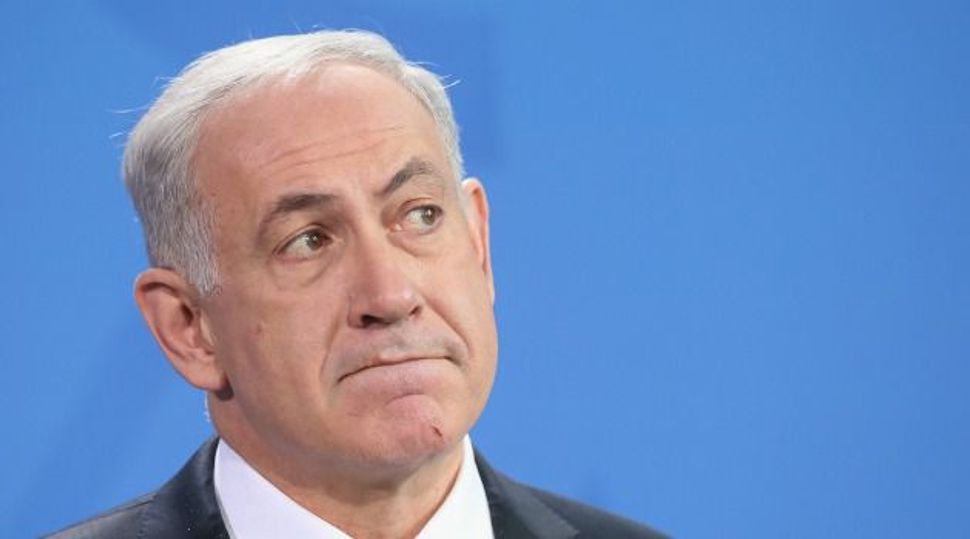Why Israel Is the Place Where Everyone Knows Your Nickname

All the Nicknames: Benjamin Netanyahu is known as ?Bibi,? but many prominent Israeli politicians have not been called by such informal names. Image by Getty Images
Israel, we are told by a recent Associated Press article, is a “notoriously close-knit, informal” society, in which “personal boundaries are thin and everyone seems to meddle in everyone’s business.” One thing that proves this, the article states, is the nicknames by which many Israeli politicians are and have been known to their fellow countrymen. Names such as “Bibi” (Benjamin Netanyahu), “Bogy” (Moshe Ya’alon, Israel’s defense minister), “Bougie” (Isaac Herzog, newly elected Labor Party leader), “Tzipi” (Tzipora Livni, currently minister of justice), “Arik” (Ariel Sharon) and so on, testify, one AP interviewee declared, to Israel’s being a place in which “everyone knows everyone and all it takes is for someone to overhear your mother calling you a name and then everyone calls you that.”
Really? Although Israel is indeed a small country in which personal ties count for much, I doubt whether nicknames play more of a role in its politics than they do in those of some other countries. Certainly, most of Israel’s prominent politicians have not been known by nicknames (one might list, among prime ministers, Ehud Olmert, Ehud Barak, Shimon Peres, Yitzhak Rabin, Yitzhak Shamir, Menachem Begin, Levi Eshkol, Moshe Sharett and David Ben-Gurion) — and conversely, many political leaders elsewhere have been.
Take the presidents of the United States. Dwight Eisenhower was widely called “Ike,” and James Earl Carter Jr. was always “Jimmy.” Abraham Lincoln was “Abe,” Chester Arthur was “Chet” and William Howard Taft was sometimes referred to by his childhood moniker of “Big Lub.” And then there’s “Teddy” Roosevelt, “Jack” Kennedy (along with his brothers, “Bobby” and “Ted”), “Bill” Clinton and “Dubya” Bush (although largely used during George W. Bush’s two terms in office by his detractors, this was originally a Texanism coined by friends). Israeli politicians have no monopoly on nicknames.
There is, of course, something ostensibly paradoxical about nicknames that go public, since the social function of such names is, by and large, to draw a line between a person’s family, friends and close acquaintance, who address him or her familiarly, and the rest of the world, which does not. Most of us would find it presumptuous for someone who does not know us well to call us by a nickname used by those to whom we are close. For a politician to encourage or simply tolerate the universalization of his or her nickname is a phenomenon of democratic politics. It conveys a message: “I am everyone’s friend, so please address me like one — and vote for me in the next election.”
Some societies use nicknames more than others; America and Israel are examples. Yet before jumping to hasty conclusions about what this says about a society, we need to consider what it says about a society’s language. Many languages have grammatical ways of distinguishing between those who belong to one’s social circle and those who do not; most commonly this is done by employing different pronouns for each group. In a large number of European languages, for example, such as French, German and Russian, one form of singular “you”(French tu, German du, Russian ty) is used in situations of social closeness, and another (vous, Sie, vy) in those of social distance. In certain non-European languages, such as Japanese or Indonesian, pronouns like “I,” “he” and “she” may also be affected, so that the wording of a sentence like “I see him” depends on the social relationship between the seer and who is seen.
English and Hebrew are among the world’s languages that do not make such pronominal distinctions. (English once did, until the familiar “thou” dropped out of it and was replaced in all situations by “you.”) One traditional way of compensating for this has been to separate those with whom we are on a first-name basis from those with whom we are not, so that whether I address you as “John” or “Mr. Jones” (or by some other title), or as “Moshe” or “Adon Cohen,” involves a choice similar to that between tu and vous. And because Israeli society is even more informal than American, first names are used in it more freely. It is perfectly normal in the Israeli army, for instance, for soldiers to be on a first-name basis with their commanding officers, which would be inconceivable in the American military.
The problem is that when first names become used so widely, they cease to perform the tu-vous function. Now some other way of performing it is necessary — and this is where nicknames come in. If I call you “Moishik” or “Moshke” instead of “Moshe” — or for that matter, “Bibi” instead of “Binyamin” — I am restoring the “Moshe/Adon Cohen” distinction that has largely been lost by using “Moshe” so much. An Israeli will call someone “Moshe” rather than “Adon Cohen” even if he hardly knows him, but he is not very likely to call him “Moishik.”
This is why nicknames in Israel are so common. It has nothing to do with people knowing everyone or hearing what their mothers called them. That’s a sociological urban legend, not a socio-linguistic analysis.
Questions for Philologos can be sent to [email protected]























